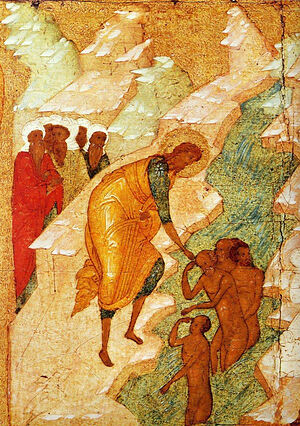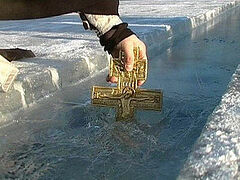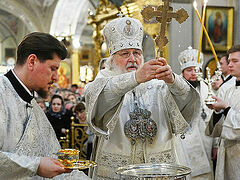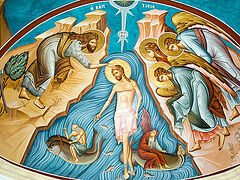The following homily was delivered on the eve of the Great Feast of Theophany. It was originally printed in the book Părintele Sofian [Fr. Sofian], published by the Byzantine Publishing House in Bucharest in 2007.
***
 Christian brothers! Just a few days have passed since the Nativity of Jesus in the Bethlehem stable. In His great humility, Jesus Christ deigned to be born there as a servant, in a manger. And today, on the eve of the great feast of the Baptism of the Lord, Jesus Christ, having reached the age of thirty, comes to the banks of the Jordan, where a great multitude of people were gathered.
Christian brothers! Just a few days have passed since the Nativity of Jesus in the Bethlehem stable. In His great humility, Jesus Christ deigned to be born there as a servant, in a manger. And today, on the eve of the great feast of the Baptism of the Lord, Jesus Christ, having reached the age of thirty, comes to the banks of the Jordan, where a great multitude of people were gathered.
On the vast plains of the Jordan, crowds of people converging from all across the Holy Land heard the voice of the great Baptist, St. John, and were in awe of him. What power this great prophet possessed, who did not work any miracles, did not heal the sick, did not multiply loaves, but so shook the assembled people that they fearfully asked what they had to do to be saved! And he taught them to give more alms and lead their lives in holiness.
And then, in such a great and rare commotion in the Holy Land, Jesus of Galilee appears with the great prophet St. John the Baptist, at the age of thirty.
Jesus slowly made His way through the crowd to St. John. The multitude of people did not know Him yet, and St. John said of Him, pointing to Him:
Behold the Lamb of God, Which taketh away the sin of the world (Jn. 1:29).
Jesus approaches him and asks to be baptized. And there, on the banks of the Jordan, a striking dialogue between Jesus and St. John the Baptist takes place. St. John says to Him:
I have need to be baptized of Thee, and comest Thou to me? (Mt. 3:14).
And Jesus answers him:
Suffer it to be so now, John. Baptize Me, for thus it becometh us to fulfil all righteousness (Mt. 3:15).
And St. John, the great prophet of the Jordan desert, stern in appearance, but filled with great meekness and great humility, agrees to baptize Jesus Christ.
When St. John the Forerunner was baptizing, a great multitude of people went into the water of the Jordan, and they all stood there till they publicly confessed their sins, and then came up out of the water. Jesus Christ went into the water, was baptized, and immediately came up out of the water, says the Evangelist Matthew who was standing there and was eyewitness to this (cf. Mt. 3:16). Christian brothers, Christ came out of the water quickly because He had no sin. He Himself speaks about it before the face of His enemies:
Which of you convicteth Me of sin? (Jn. 8:46).
And at that moment, the heavens open wide—the eastern sky, clear and blue—and the Holy Spirit descends from Heaven in the form of a dove over Jesus Christ, and St. John sees Him, and from Heaven comes a voice, crying:
This is My beloved Son. Hear Him!
At that moment, Christian brothers, the Holy Trinity was revealed to the world, before the eyes of all: The Father utters the words, This is My beloved Son, the Holy Spirit descends in the form of a dove, and the Savior Jesus stands in the waters of the Jordan. The Holy Spirit, the whole Trinity will appear once more on Mt. Tabor, when the Holy Spirit appears in the form of an extraordinary light, and God the Father utters from the cloud: This is My beloved Son, and the Son shines forth in the great light of Tabor, the Divine light. Tomorrow will be a great feast in the Jordan: Almost 2,000 years ago there occurred an event unique in all of history—the Baptism of the Son of God. The Incarnation was accomplished in Bethlehem, and here was the Baptism of the Lord. On this day, Heaven was opened, and from that time the Holy Spirit has been descending upon people, and people draw near with total faith to the Triune God—the Father, the Son, and the Holy Spirit.
Christian brothers, the holy fathers, especially St. John of Damascus, have elaborated upon these questions and teach us that there are eight baptisms in the history of the world. I will tell you about them according to the Fount of Knowledge of St. John of Damascus—the great theologian, the great father of the Church, of our holy Orthodoxy.
The first baptism, says St. John, was the Flood. As we know, the word “baptism” comes from the Greek word βαπτίζω, which means “to immerse.” So, here was an immersion of all the people in water for their and our sins.
The second baptism, “by the sea and the cloud,” took place in the Sinai desert, when the chosen people left Egypt for the Holy Land.
The third baptism was prescribed by the Old Testament law, for according to it every unclean person had to wash himself with water and wash his clothes, and only then could he enter the camp (cf. Lev. 16:26), which was also established in the Sinai desert.
The fourth baptism is the baptism of the people by St. John, whom we will meet tomorrow. It was introductory, leading the baptized to repentance so they might believe in Christ. I, says St. John, indeed baptize you with water unto repentance, but He that cometh after me … shall baptize you with the Holy Ghost, and with fire (Mt. 3:11). Thus, St. John cleanses people with water for the reception of the Spirit.
The fifth baptism is the Baptism of the Lord, of Christ the Savior, by which He Himself was baptized. He was baptized not because He needed purification, but because He experienced my purification, the purification of all of us, to break the heads of the dragons in the water (cf. Ps. 93:13), to drown sin, to bury the whole old Adam in water, to sanctify the Baptist, St. John, that he might fulfill the Law, reveal the mystery of the Trinity, and give us an example and model, and that we might also be baptized.
We are baptized with the perfect Baptism of the Lord—with water and Spirit. It is said that Christ baptizes with fire because He poured out the grace of the Holy Spirit upon the holy apostles in the form of fiery tongues, as the Lord Himself says: For John truly baptized with water; but ye shall be baptized with the Holy Ghost not many days hence (Acts 1:5)—thus spake the Savior to His apostles after the Resurrection.
The sixth baptism is the baptism in repentance and tears, which is truly difficult.
The seventh baptism is the baptism of blood and martyrdom, with which Christ Himself was baptized in our stead. It is duly honorable and blessed, because it cannot be subsequently defiled by impurity.
The eighth and final baptism is not salvific, but on the one hand, it destroys malice—for malice and sin will no longer rule, while on the other hand, it punishes eternally. This is the baptism with eternal fire, following the universal Judgment.1
We confess Baptism for the remission of sins, for eternal life. Baptism points to the Lord’s death. Thus, by Baptism, we are buried together with the Lord, as says the divine apostle (cf. Rom. 6:4).
Just as the Lord’s death occurred once, so we must be baptized once. There are certain sects where if someone joins, they baptize him a second time. They commit a very great sin.
We are baptized, according to the word of the Lord, in the name of the Father, and the Son, and the Holy Spirit (cf. Mt. 28:19), and by these words we learn to confess the Father, the Son, and the Holy Spirit. Thus, everyone who was baptized in the name of the Father, and the Son, and the Holy Spirit and thus has been taught that the Godhead has but one nature in Three Persons, but is then baptized anew, crucifies Christ anew, as the divine apostle says: For it is impossible for those who were once enlightened by Baptism … to renew them again unto repentance; seeing they crucify to themselves the Son of God afresh, and put Him to an open shame (Heb. 6:4-6).
This is what those who are baptized a second time do in their impudence and insolence. But all those who were not baptized into the Holy Trinity must be rebaptized.
God created us for incorruption, for Heaven, for Paradise, for light, but, because we trampled upon His saving commandment, He condemned us to the corruption of death. Yet, that evil might not be eternal, He, according to His mercy, descended to the slaves; and, becoming like us, delivered us from corruption by His Passion. He poured out for us the fount of forgiveness from His holy side. Thus, the water flowing from His side serves for our regeneration and the drowning of sin and corruption, and the blood is the drink that brings eternal life, that is, Holy Communion.
He commanded us to be reborn of water and the Holy Spirit, because through prayer and the invocation of the Holy Spirit, He descends upon the water. But as man is twofold, consisting of soul and body, He gave us a twofold purification: of water and the Holy Spirit. On the one hand, the Spirit restores us to a state according to the image and likeness of God, and on the other hand, water, by the grace of the Holy Spirit, cleanses the body from sin and frees it from corruption. Water is an image of death, and the Spirit gives the pledge of life.2
Christian brothers, I have told you this now so we would all understand what the great Mystery of Holy Baptism means. By the birth of the Lord Jesus Christ, God humbled Himself to become incarnate in the form of a slave. And by the Baptism of the Lord, man was deified. We still don’t understand this enough, but Baptism, Christian brothers, means rebirth, the birth of a human being anew; a new being—mental, human, spiritual—is formed.
The infant who is immersed in the water of Baptism is radiant as an angel, blameless, sinless, and passionless. The sin of our first parents is abolished, and the sin in him at the moment of Baptism is also destroyed, so that the infant appears in the light of the Godhead.
Therefore, Christian brothers, contemplating the Mystery of Baptism, the Baptism of the Lord, let us remember our Christian Baptism, our infancy; let us reflect upon the sanctity of our life. Let us try, Christian brothers, to revive it and be baptized anew with repentance and tears, as St. John of Damascus says of the sixth baptism. Let us guard ourselves in purity and holiness of life, knowing full well that, as the holy apostle Paul says, nothing impure will enter the Kingdom of Heaven, but only holiness, holy purity, only tears of repentance—only this enters there (cf., for example, Eph. 5:5, Acts 14:22).
When we try to enter there with all the baggage of our worldly corruption, we will be turned away from the entrance. Guardian angels with fiery swords will cast us away from the face of God. Therefore, let us take care for our lives, for we will give an answer for every sin unconfessed and unforgiven. Let us be more attentive to our lives, that we might spend them in the fear of God, in the fulfillment of the commandments, and in the holiness that God desires of us.
Amen.



